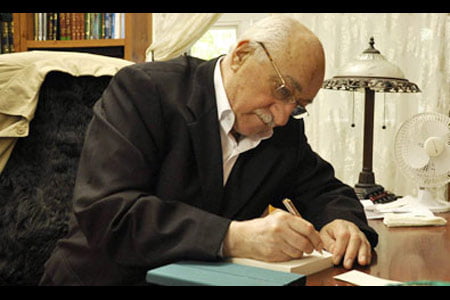New book looks closer into Hizmet Movement with questions, answers

Date posted: March 17, 2013
ŞULE KULU, İSTANBUL
A newly published book by Professor Muhammed Çetin, a sociologist who has done extensive academic work on social movements and who now serves as a lawmaker in the Turkish Parliament, offers comprehensive information on the faith-based Gülen movement, answering hundreds of questions on the movement.
The book, titled “Hizmet: Questions and Answers on the Gülen Movement” and published by Blue Dome Press, brings detailed answers to 340 questions on the Gülen movement, which is also referred to as “Hizmet” (service), under 10 subheadings.
While explaining why he wrote the book, Çetin, the author of a 2009 book titled “The Gülen Movement: Civic Service without Borders” based on his own sociological research and analysis of the movement, says following the publication of “The Gülen Movement: Civic Service without Borders,” he was asked by many readers to make the same information available to a wider audience.
“To that end, I have attempted to represent what I found in my research in a question-answer format stripped of sociological jargon as far as possible. It is my sincere hope that this effort will make knowledge about the movement and the movement itself more accessible to those very people who commit to self-sacrifice and serving others in Hizmet and other peaceful civil society movements all over the world; that is, it has been written for all concerned, caring peaceful citizens of whatever nation,” Çetin says in the preface of the book.
As Çetin writes, the Gülen movement originated in 1970s Turkey as a faith-inspired initiative to improve educational opportunities for a local community, and since then it has grown into a transnational educational, inter-cultural and interfaith movement. It is estimated that participants number in the several millions.
Responding to a question in the introductory section on why the book is needed, Çetin says Hizmet has attracted a great deal of academic attention in recent years, but more studies are still needed to describe it fully and accurately. “This book is intended to summarize and represent the conclusions of much of that academic work in a manner more easily accessible to the lay person or non-specialist,” he says.
After an introductory section in which the writer provides quick facts about the movement and answers questions such as “When did Hizmet start as a movement?” and “What makes Hizmet different from movements past and present in Europe?” the book takes a closer look into the history of Hizmet with a special emphasis on the life of well-respected Islamic scholar Fethullah Gülen, who inspired the movement, under the headline of “Gülen and the Formative Years of Hizmet.” This section provides detailed information on Gülen’s life, from his formative experiences in the development of his own leadership to how his “new type of community action started to be widespread.”
The writer then answers questions on the activities, services and institutions of the movement, namely schools, media outlets and dialogue platforms.
One frequently asked question about the schools of the movement finds an answer in this section: “What is Gülen’s relationship with the schools in Turkey and abroad?”
“There is not a single school in the records of the Ministry of Education of Turkey or anywhere else in the world which is registered in the name of Fethullah Gülen; they are all registered in the names of foundations,” the answer says.
The writer says because of its brevity, outsiders tend to use “Gülen schools” rather than “Gülen-inspired schools.” “The shorter term seems to imply some sort of central control of activities and even an ideology, while the second makes it clearer that there is no centralization in the movement,” he says.
Goals and nature of Hizmet
One of the most noteworthy parts of the book is a section that includes questions on the goals of the movement, which has been a matter of controversy in both Turkey and abroad. Answering questions such as “How can the movement’s goals be characterized? What goals take priority in Hizmet?” and “Is the movement hiding its intentions?” the writer firstly stresses that the goals of the movement are overt. Noting that other characteristics of Hizmet’s goals include being consistently positive, constructive and non-disruptive, he says that in the Gülen-inspired educational institutions specifically, “the primary purpose of the education is to ensure respect for objective and universal human values.”
While explaining the nature of Hizmet, the writer answers these questions: What sort of leadership does Hizmet have? Is Hizmet a political or cultural movement? Is Hizmet a sect or cult? Is Hizmet conflictual or violent? Is Hizmet anachronistic? What is Hizmet’s relation to democracy? And what is Hizmet’s relation to civil society?
Defining Gülen as a “servant leader,” Çetin lists the qualities that characterize him as such, which include the dedication of his life to solving social problems and a profound appreciation of the Islamic sciences and contemporary thought.
He denies that Hizmet is a political movement, noting that the movement fits the description of a non-political movement, which he says “strives for a more efficient functioning of the system or apparatus of society or, in fact, for that system’s more successful outcomes.”
The writer also says the movement does not fit any of the criteria which are used to identify sects or cults, underlining that the movement has never attempted to form a distinct unit within Islam.
According to Çetin, the movement has no special doctrines or dogmas, no private texts or procedures, no rites, rituals, insignia, costumes or ceremonies that mark people as having “joined.” “Indeed, there is no membership, properly speaking, and certainly not an exclusive one,” he adds.
The writer also stresses that Hizmet is not a conflictual or violent movement. “What is common to all projects, services and institutions of the movement is that they are entirely located within the limits of compatibility of the system. They are not oriented towards conflict or breach of those limits. Gülen-inspired institutions are never brought into conflict with the state. None of the projects in which Hizmet participants are involved ever break the rules of society, nor do they try to change ‘the rules of the game’ no matter what field they are concerned with,” he says.
Çetin’s book provides comprehensive and well-established answers to the questions that can come to anyone’s mind on a civil society movement which has securely established, respected institutions — of different kinds, but mostly schools — on nearly every continent.
Originally written in English, the book has also been published in Italian and Spanish. The Blue Dome team recently announced that French and German versions are already on the way. As interest about the movement grows, more editions seem likely to appear in different world languages.
Source: Today’s Zaman 17 March 2013
Tags: Fethullah Gulen | Hizmet (Gulen) movement |
























